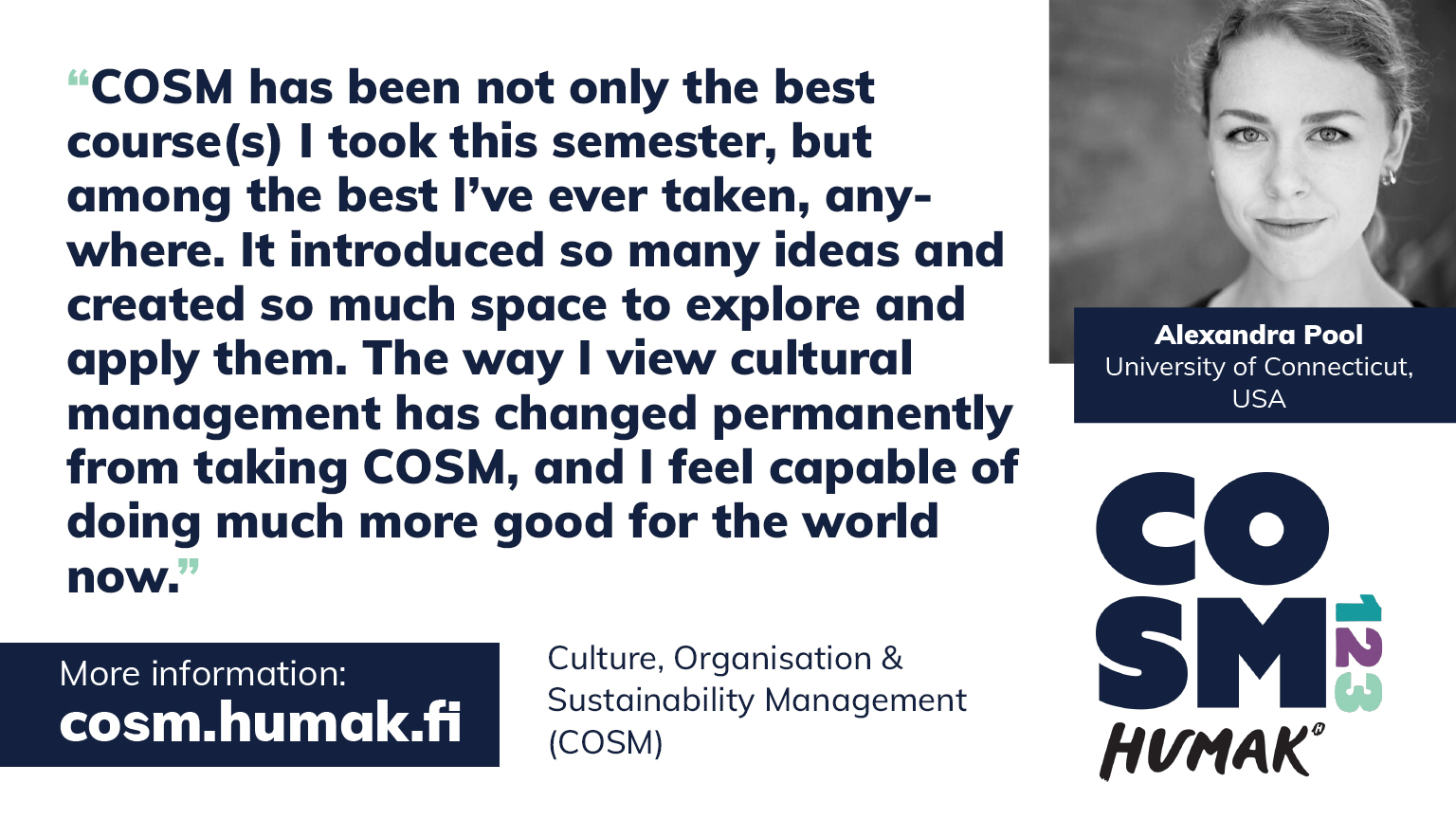Sustainable Film Production with Ecological Production Plan

A Humak student set out to find ways of reducing the ecological footprint in film production. As a result, an ecologically sustainable film production plan was created. The plan, which is applicable to all audiovisual projects, allows for ecological choices to be made in every stage of the production process.
Climate change is one of the most major crises of our time. Accordingly, its effects are already visible all over the planet. The carbon footprint of the cultural sector is significant especially in terms of film and television production. However, not enough concrete action has been taken to reduce it.
As many creative processes are unsustainable at their core, it is necessary to find sustainable alternatives to them. Humak’s aim is to spread this idea by offering courses that teach how to adhere to these values in cultural management.
If you are interested to study the subject further, you can apply to our Master’s level study module COSM (Culture, Organisation & Sustainablity Management). Two courses of COSM are now available at Humak Open UAS for everyone to register: Cultural Entrepreneurship & Sustainability Management 5 ECTS (deadline 21.2.), and Cultural Management and Dimensions of Sustainablitity: Environmental, Social & Economic 5 ECTS (deadline 28.3.).

Ecological burden caused by the audiovisual industry is massive
Maria Hatakka, now Bachelor of Cultural Management, put her Humak studies into practice by creating an ecologically sustainable film production plan in her thesis. Due to the massive ecological burden caused by the film industry worldwide, Hatakka believes that the audiovisual sector ought to be more responsible in terms of climate action in the future.
According to Hatakka, the audiovisual industry in Finland is significantly behind in terms of sustainable development in comparison to the rest of the world. Therefore, it is urgent to address the lack of cultural management and production frameworks that can further sustainability.
Carbon footprint calculator specified for film production is needed
Sustainability and ecological choices are often seen as unattainable in film production, especially when there is a limited budget. As film productions are dependent on funders, it is important to include sustainability as part of the funding criteria.
Various guides have already been developed for the audiovisual sector in order to implement sustainable production. More of such concrete examples are needed, however. Hatakka believes that one way to motivate filmmakers to make more sustainable choices is to devise a carbon footprint calculator and certification specificied for the audiovisual industry. This would facilitate the planning, monitoring and reporting of sustainability measures during production.

Undoing the unsustainable and creating new norms
The key to these changes is establishing an ideological shift, which begins with the individual. A cultural manager works as a sort of social architect – they encourage people and communities to build a better future.
Hatakka’s ecologically sustainable film production plan serves as a great example of this. Not only is her plan innovative, but it is also comprehensive in that it offers more ecological solutions for each stage in the production process. The plan covers aspects such as recycling, energy consumption, and emissions.
The plan is also applicable to all films, according to Humak lecturer Minna Hautio. As Hatakka’s plan demonstrates, the key is to start by examining what can realistically be done in our everyday lives to undo the unsustainable until sustainability becomes the new norm.
COSM (Culture, Organisation & Sustainability Management)
If you are interested in taking cultural management in a more environmentally friendly direction in accordance with the values of sustainable development, we recommend looking into the COSM study module at Humak Open UAS.
The three COSM courses are closely connected by the central theme of developing new and sustainable processes for cultural management. However, it is also possible to participate in any of the courses individually. If interested, visit the COSM website for more information or enroll on the courses on our online store.
Hatakka has a long background in independent film and environmentalism
Hatakka’s thesis was inspired by her own association Linna Art House ry. The association strives to adhere to green values in its operations and produced its first full-lenght film in line with these values.
Linna Art House ry will continue to use the ecological production plan in the planning and implementation of future productions. Hatakka has a long background in independent film and has been interested in environmental issues for a long time. She has also been involved in animal welfare.
View the production plan and thesis online
The production plan (in Finnish) is available for download.
Production plan for ecologically sustainable film production -thesis.
More information:
Maria Hatakka
mariahatakka@hotmail.com
Text: Mari Ervasti.
Source: Maria Hatakka: Production plan for ecologically sustainable film production -thesis.
